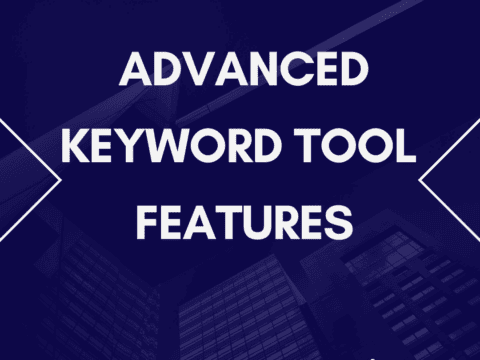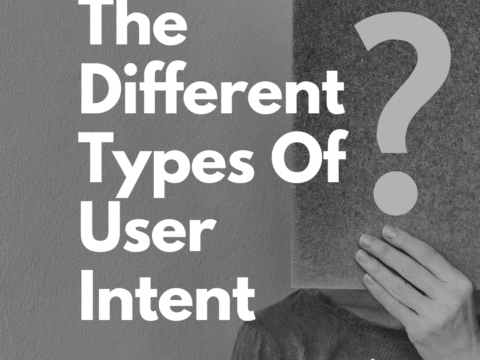In the ever-growing space of SEO software tools, Google Keyword Planner (GKP) often emerges as a knight in shining armor for many, and it’s easy to see why. It’s free, backed by the Google brand, and offers a direct line into the database of the world’s biggest search engine.
But while its prominence is unquestionable, it’s also not without its shortcomings. Relying solely on GKP for your keyword research process could mean missing out on valuable metrics and insights offered by other professional tools.
There are many nuances to a solid keyword research process – such as competitor keyword analysis, keyword difficulty metrics, and more granular search intent categorization – that GKP doesn’t delve deeply into. If you’re feeling the pinch of GKP’s limitations, this in-depth guide offers a comprehensive list of 20+ Google Keyword Planner alternatives to supercharge your keyword research efforts. Let us explore further!

Key limitations of using Google Keyword Planner as your only keyword research tool
Before we dive into our list of powerful alternatives, it’s essential to pinpoint some key areas where Google Keyword Planner does not fully meet the needs of all SEO professionals and content marketers. By understanding these limitations, you’ll be better equipped to assess which tool (or combination of tools) will best serve your specific requirements.
Focused on Google Ads
Even today, the inherent design of Google Keyword Planner is primarily aimed at advertisers on the Google Ads platform. While the data related to ad campaigns can be valuable, it does not always directly translate to the dynamics of organic search rankings. Strategies for paid advertising often differ considerably from those aimed at achieving top organic positions, making insights derived solely from GKP potentially misaligned with organic SEO goals.
Broad keyword volume estimates
Google Keyword Planner often presents keyword volume data in ranges, especially for lower-volume keywords (e.g., 10–100 monthly searches). While this gives a general sense, the broadness can significantly impede search marketers aiming for precision. This is particularly challenging when planning content for niche markets where even slight volume differences can substantially impact the outcome.
Absence of an organic keyword difficulty metric
One of the primary metrics that SEO professionals bank on is the keyword difficulty score. GKP does provide a “competition” metric with values of Low, Medium, and High. However, this reflects the number of advertisers bidding on a keyword (paid competition) and doesn’t offer a clear picture of organic search competitiveness. In short, GKP lacks a true organic difficulty indicator, which many alternative tools provide.
Missing user intent breakdown
GKP doesn’t provide keyword search intent categorization (e.g., informational, transactional, navigational). Such insights can be instrumental in tailoring content to the exact needs and expectations of searchers. Without this granularity, there’s potential for missed opportunities in aligning content with specific user intents. Note: Knowing these limitations is not about downplaying the importance of GKP. It remains a valuable tool with considerable merits. However, acknowledging its constraints can empower you to complement its data with insights from other tools, thus giving you a more holistic and well-rounded keyword research strategy.
20+ Google Keyword Planner alternatives that can supercharge your keyword research workflow
Time to dive into our meticulously curated list of top-tier keyword research tools, each spotlighting a unique capability that challenges Google Keyword Planner’s limitations. With G2 ratings and pricing details, you’re armed to make an informed choice.
TL;DR list of 23 Google Keyword Planner alternatives:
- Twinword Ideas
- Ahrefs
- Semrush
- Ubersuggest
- Keyword Tool
- Moz
- KWFinder by Mangools
- Keywords Everywhere
- SE Ranking
- Similarweb
- Serpstat
- Surfer
- Seobility
- SpyFu
- AnswerThePublic
- Soovle
- Google Trends
- SurgeGraph
- CanIRank
- Keyword Insights
- Keyword Revealer
- Jaaxy
- AlsoAsked
1. Twinword Ideas
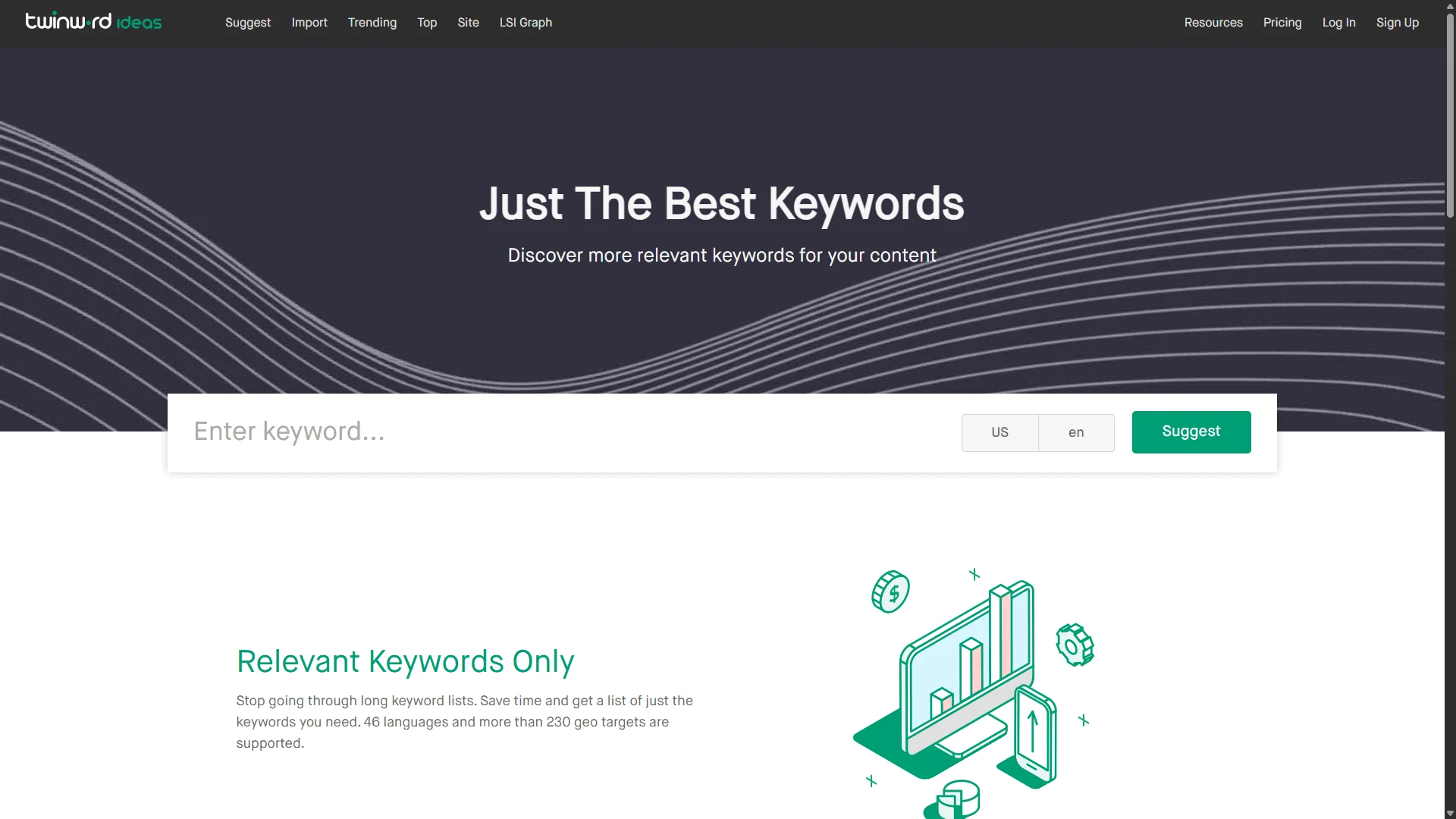
A holistic keyword research tool tailored for SEO professionals and content marketers, Twinword Ideas leverages AI to offer winning keyword suggestions, user intent analysis, automatic keyword grouping, and much more.
Twinword vs Google Keyword Planner: Key features that make Twinword stand out:
- User intent categorization: Where GKP lacks user intent categorization, Twinword Ideas shines with its precise user intent filters that enable users to directly target ‘informational,’ ‘transactional,’ or ‘navigational’ queries.
- Relevancy score: A unique feature that sets Twinword Ideas apart is its relevancy score. This score aids content creators and marketers in assessing a keyword’s relevance to their niche or topic, ensuring the content resonates with the target audience.
- Trending keywords: Twinword Ideas also helps you find recently emerging keywords on Google News. By reading related news articles, you can discover connections and relationships, giving you an edge in understanding the current trends.
- Automatic keyword grouping: Another standout feature of Twinword Ideas is its AI-powered automatic keyword grouping. Instead of sifting through extensive lists, users receive a curated set of keywords organized by popular topics and user intent.
G2 rating: 4.5/5 (2 ratings)
If you don’t have access to Google Keyword Planner, this is a fantastic alternative. It’s a platform that allows you to search for keywords and then filter the results by things like search volume, word count, and relevance score. Here’s the really cool feature, you’re also able to filter by user intent, such as ‘know,’ ‘do,’ ‘buy,’ and ‘local’.”
– Elizabeth Bradshaw of Canvas Arts Boutique / Business Owner
- A freemium version is available to try the product without requiring any sign-in. Run a free keyword search now.
- Paid subscription plans start from $12/month when billed annually with an impressive 30,000 keyword suggestions limit per month.
2. Ahrefs
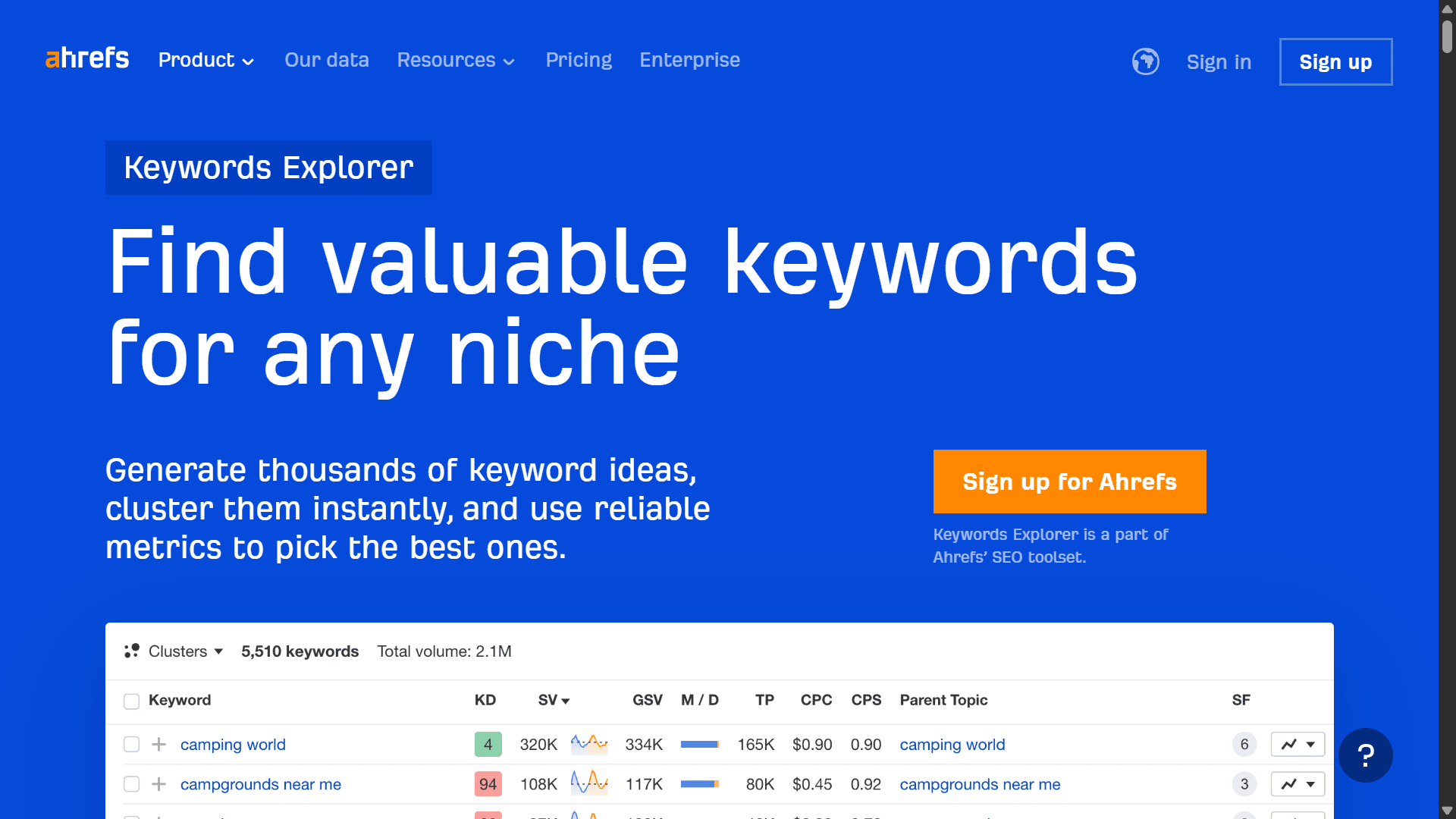
Ahrefs is a renowned all-in-one SEO suite, and its Keywords Explorer is a standout component for keyword research. Backed by one of the largest backlink indexes and keyword databases in the industry, Ahrefs helps marketers uncover keyword opportunities that competitors might miss.
Ahrefs vs Google Keyword Planner: Key features that make Ahrefs stand out:
- Massive keyword database: Ahrefs boasts over 10 billion keywords across multiple countries, providing a wealth of suggestions that far exceeds GKP’s data limits.
- Multi-platform keyword data: Beyond Google, Ahrefs provides keyword data for 10 search engines, including YouTube, Amazon, and Bing, leveraging clickstream data for more accurate volume estimations.
G2 rating: 4.5/5 (552 ratings)
- Freemium keyword generator tool is available with limited metrics.
- Paid subscription plans start from $99/ month.
3. Semrush
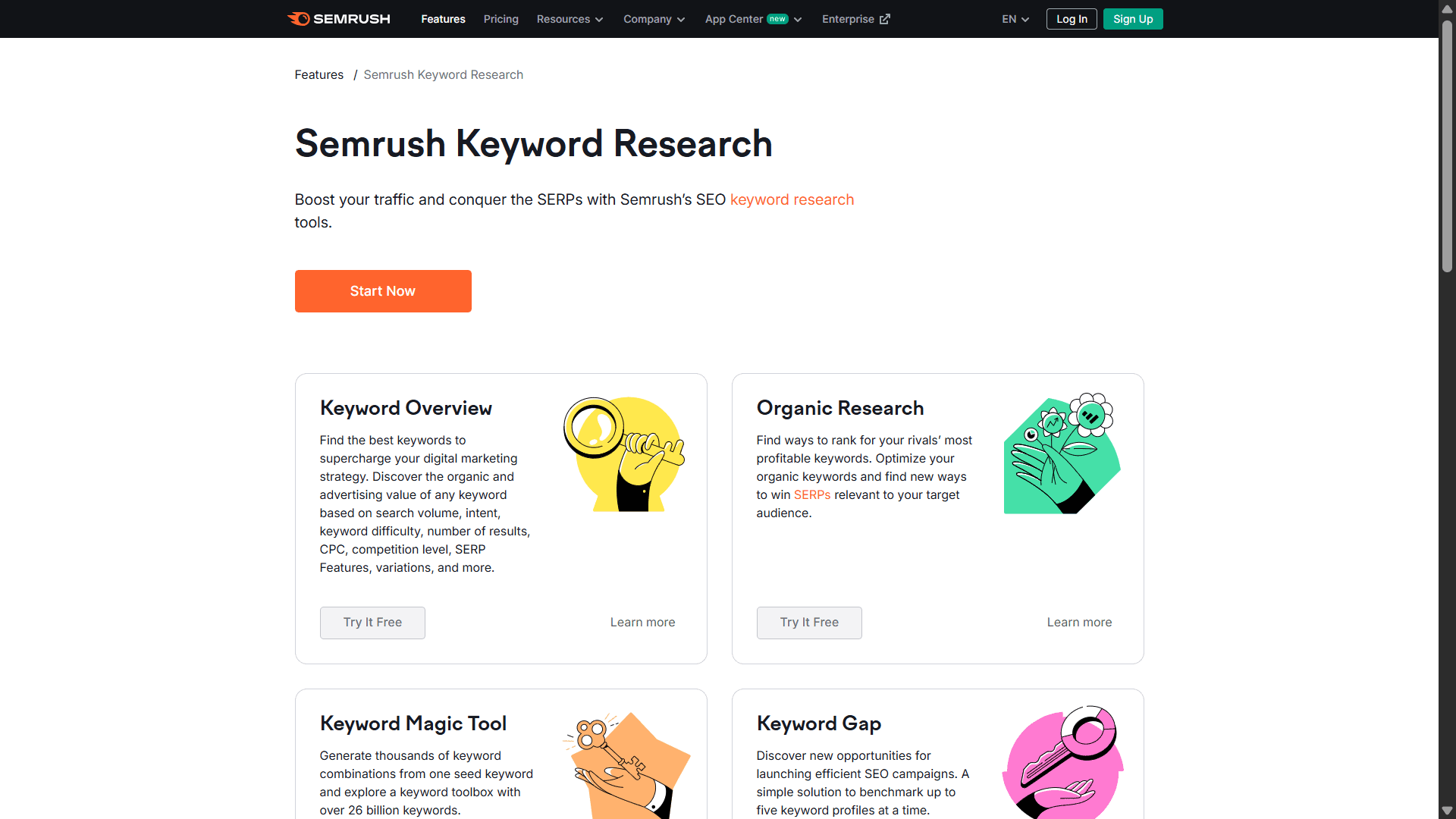
Semrush is a widely recognized SEO and digital marketing platform offering dozens of tools – with keyword research at its core. Its Keyword Overview and Keyword Magic Tool help users gain in-depth insights for any search term. Semrush is known for going beyond what GKP offers, integrating both SEO and PPC data.
Semrush vs Google Keyword Planner: Key feature that makes Semrush stand out:
- Discovering new opportunities: Semrush excels at suggesting related keywords and question-based queries. For example, its Keyword Magic Tool generates extensive long-tail variations and clusters them by topic. It also shows “People also ask” questions and SERP feature data.
G2 rating: 4.5/5 (2492 ratings)
- Freemium version is available (capped daily searches and results).
- Paid subscription plans start from $117.33/month when billed annually.
4. Ubersuggest
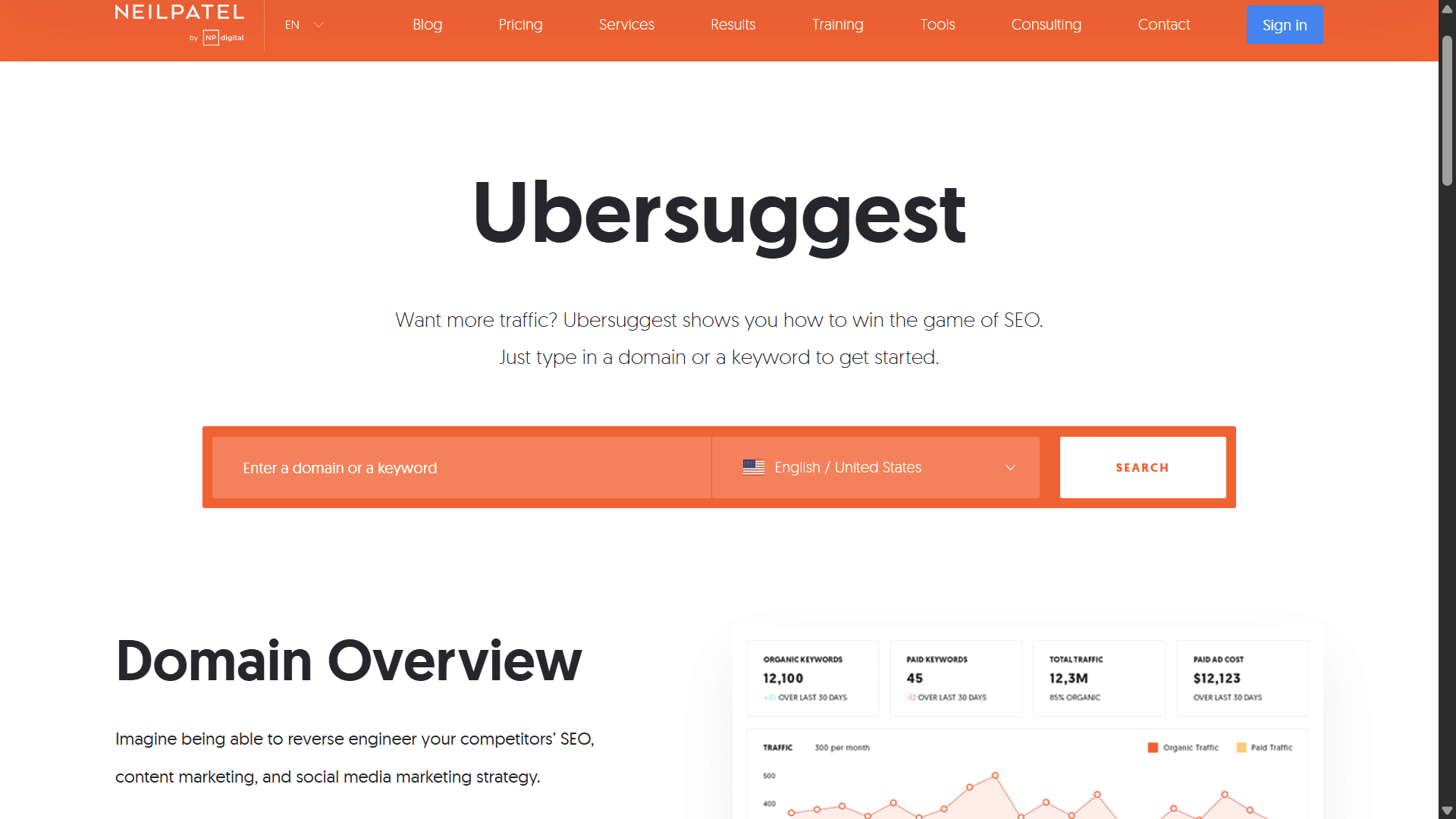
Ubersuggest, created by Neil Patel (NP Digital), is a versatile SEO tool that has rapidly grown as a popular Google Keyword Planner alternative. It provides keyword ideas, traffic analysis, and even site audit features, aiming to be an affordable all-in-one solution.
Ubersuggest vs Google Keyword Planner: Key feature that makes Ubersuggest stand out:
- Extensive keyword suggestions: Ubersuggest generates a broad list of keyword ideas for any seed term – including long-tail variations, questions, and prepositional phrases. It pulls not only from Google Autosuggest but also from sources like Google Trends. Each suggestion comes with search volume, SEO difficulty, and PPC competition metrics, which go beyond GKP’s basic output.
G2 rating: 4.2/5 (142 ratings)
- Free trial available.
- Paid plans start from $12/month.
- One-time purchase options are available from $120.
5. Keyword Tool
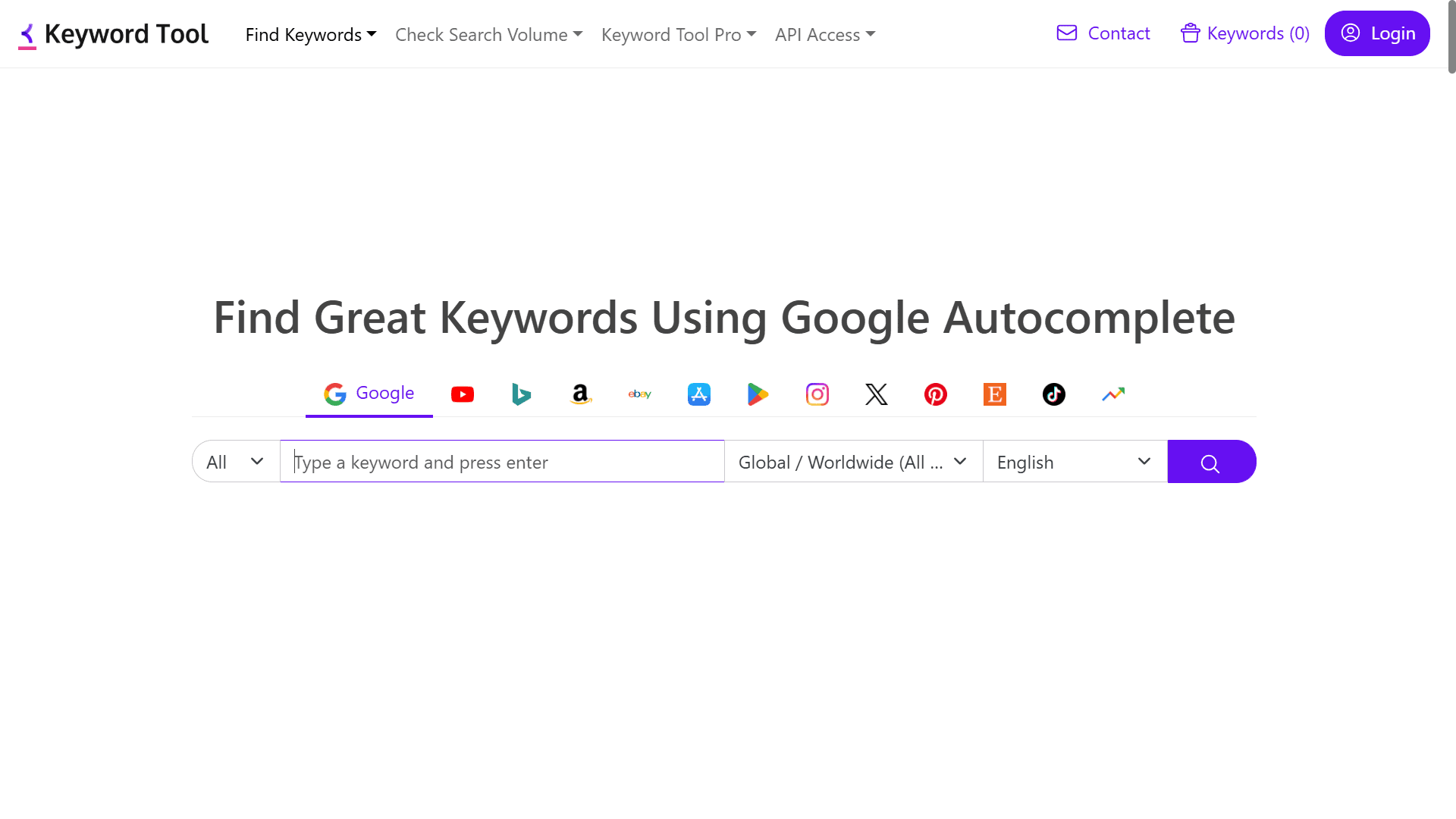
Keyword Tool (often referred to by its domain KeywordTool.io) is a powerful freemium keyword generator that uses Google Autocomplete data to produce hundreds of long-tail keyword suggestions. It’s known for providing keyword ideas fast and in bulk – a great complement to GKP’s more limited suggestions.
Keyword Tool vs Google Keyword Planner: Key feature that makes Keyword Tool stand out:
- International and multi-platform support: Keyword Tool supports 192 Google domains and 83 languages, allowing you to get keyword suggestions tailored to different countries or languages easily. GKP also has localization, but Keyword Tool simplifies toggling between locales. Moreover, the software can fetch suggestions not just from Google but also from YouTube, Bing, Amazon, Instagram, Twitter, and more (on paid plans). This multi-platform approach helps marketers who need keyword ideas for platforms beyond Google Search.
G2 rating: 4.5/5 (19 ratings)
- Free trial available.
- Paid subscription plans start from $69/month when billed annually.
6. Moz Keyword Explorer
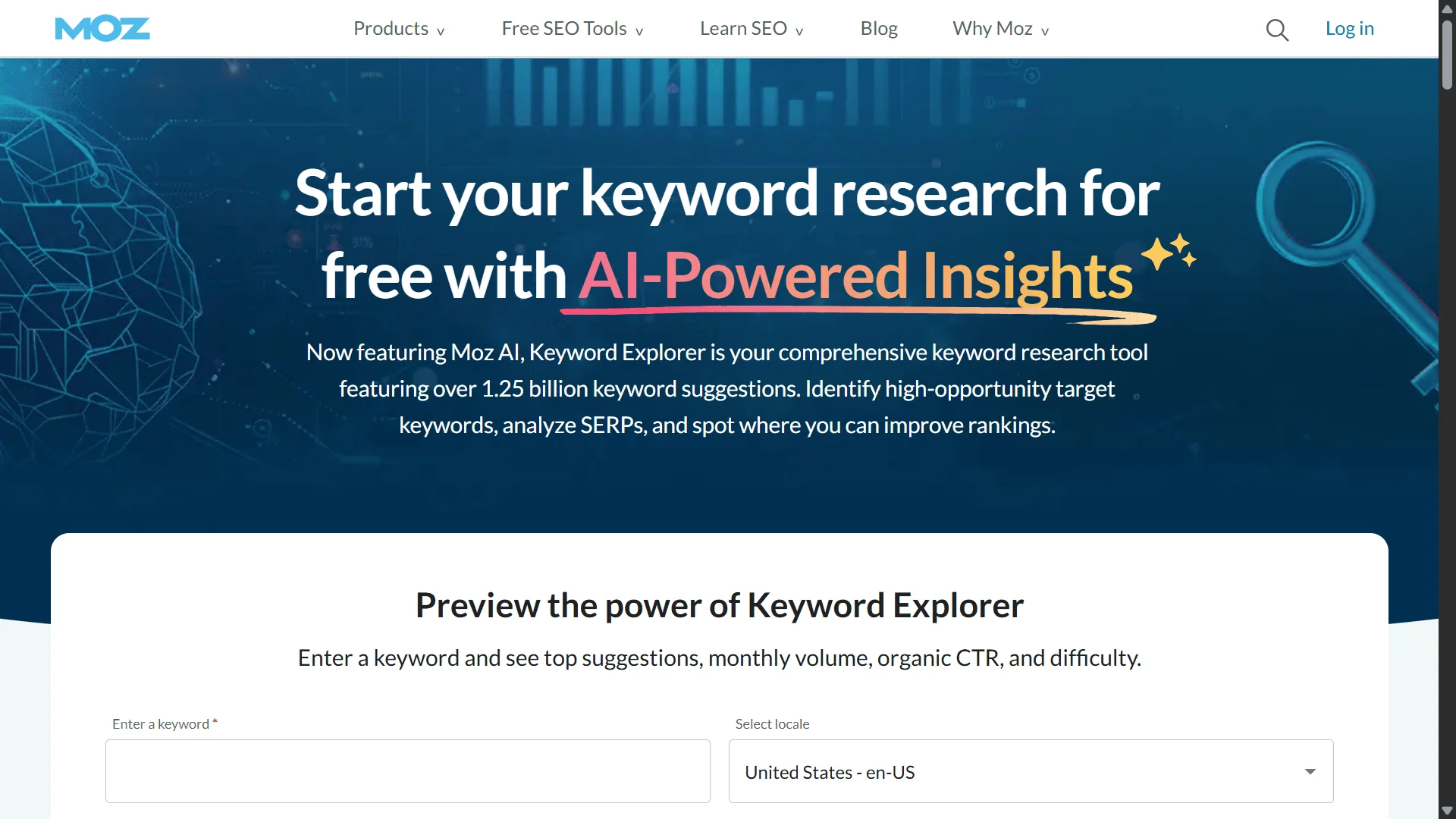
Moz Keyword Explorer is part of the Moz Pro suite and remains a favorite for many SEO professionals due to its accuracy and ease of use. It provides a balance between powerful data and an intuitive interface, making it a strong alternative to Google Keyword Planner.
Moz Keyword Explorer vs Google Keyword Planner: Key feature that makes Moz Keyword Explorer stand out:
- Proprietary metrics (Priority & Opportunity): Moz uses metrics like Keyword Difficulty (how hard it is to rank) and Opportunity (estimated click-through rate) to help prioritize keywords. It even offers a composite “Priority” score that combines volume, difficulty, and CTR – giving a single gauge of a keyword’s potential. GKP does not offer such composite scoring, so this helps in decision-making.
G2 rating: 4.3/5 (569 ratings)
- 30-day free trial available.
- Paid subscription plans start from $39/month when billed annually.
7. KWFinder by Mangools
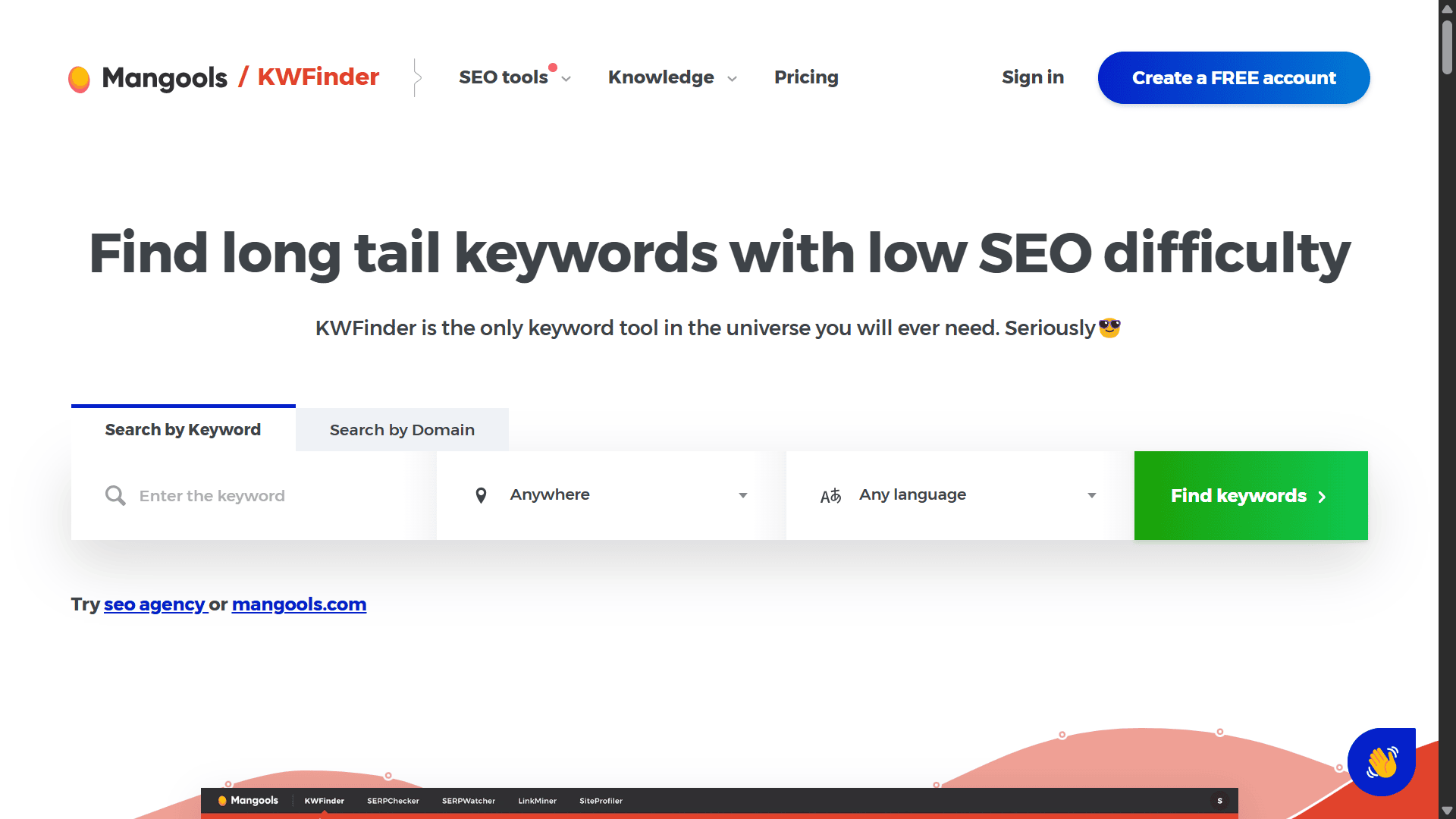
KWFinder (part of the Mangools suite) remains a user-friendly tool specifically focused on finding low-competition, long-tail keywords. Its clean interface and straightforward metrics make it ideal for marketers who find GKP overwhelming or limited in scope.
KWFinder vs Google Keyword Planner: Key feature that makes KWFinder stand out:
- Ease of use and visual keyword metrics: KWFinder is praised for its intuitive UI. When you search a keyword, it presents a list of suggestions with color-coded difficulty scores at a glance – green for easy, red for hard. This immediate visual cue (using Mangools’ own SEO Difficulty metric) is something GKP doesn’t provide, as GKP focuses on Ad competition rather than organic difficulty.
G2 rating: 4.4/5 (18 ratings)
Pricing:
- Freemium version is available.
- Paid subscription plans start from $14.95/month when billed annually.
8. Keywords Everywhere

Keywords Everywhere is a browser extension (Chrome/Firefox) that transforms your web browser into a keyword research tool. As you perform Google searches, it automatically displays search volume, CPC, and competition data next to the search box and under Google’s results – effectively bringing some GKP data into your everyday searching. Keywords Everywhere vs Google Keyword Planner: Key features that make Keywords Everywhere stand out:
- On-page insights: Unlike GKP which is a separate interface, Keywords Everywhere works in context. For example, when you search on Google, it will show a sidebar with “Related Keywords” and “People also search for” suggestions with their volume and competition metrics. It’s a convenient way to get keyword ideas as you browse, eliminating the need to constantly switch to GKP.
- Multi-site integration: The extension not only shows data on Google Search, but also on YouTube, Amazon, eBay, Etsy, Bing, and more. It will display keyword metrics on those sites’ search pages and even tools like AnswerThePublic. This breadth makes it handy for researching keywords on various platforms with one tool.
G2 rating: Listing not available
- Paid subscription plans start from $2.25/month.
9. SE Ranking
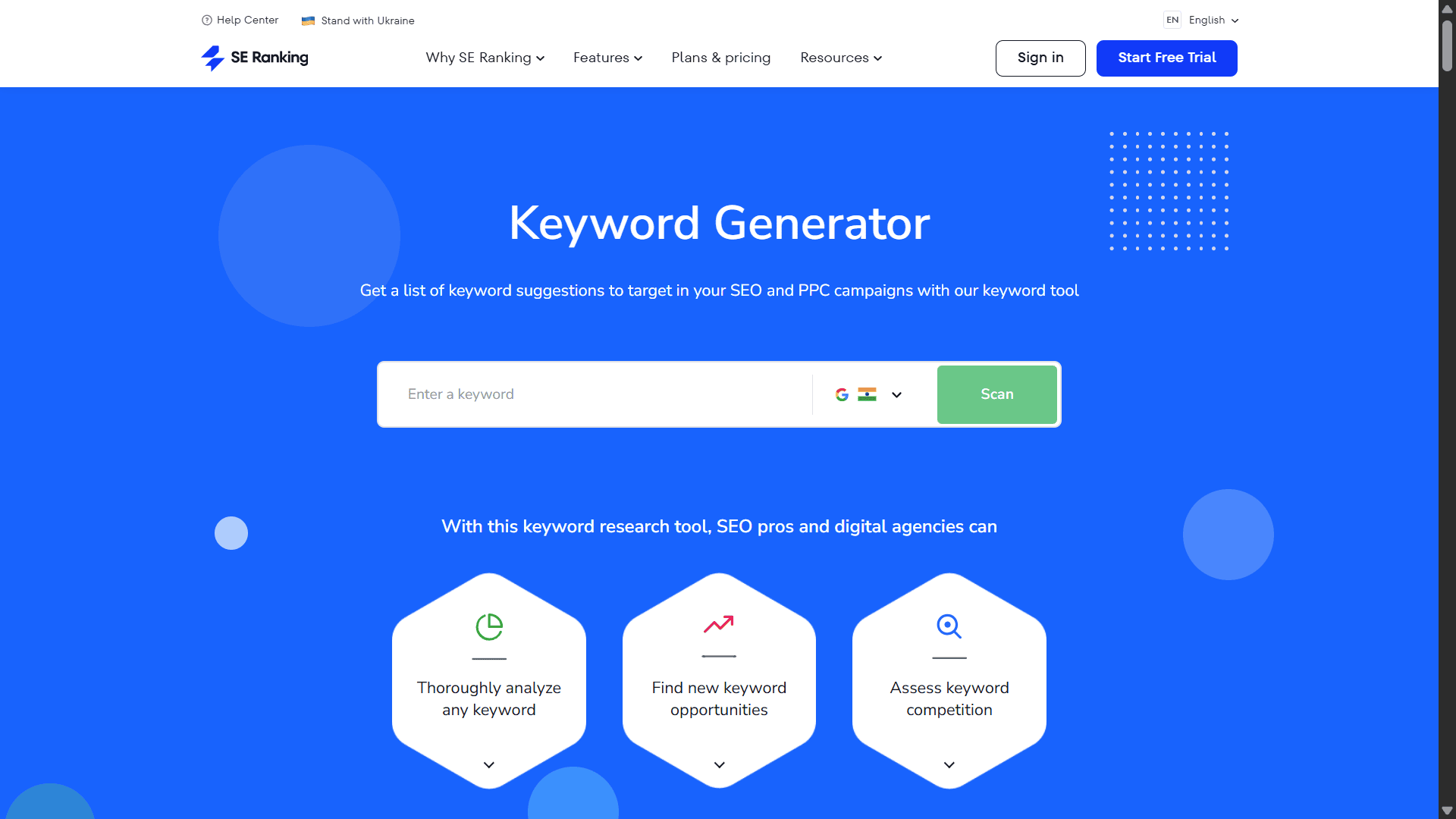
SE Ranking is an all-in-one SEO toolkit that has gained considerable popularity, especially among small to mid-sized agencies and in-house teams. It includes rank tracking, site audit, and backlink tools, but its keyword research module makes it a worthy Google Keyword Planner alternative.
SE Ranking vs Google Keyword Planner: Key feature that makes SE Ranking stand out:
- Keyword suggestion tool and clustering: SE Ranking offers extensive related keyword suggestions and has a built-in keyword grouping (clustering) feature. You can take a list of keywords and have SE Ranking automatically group them by similarity (based on SERP results) – extremely useful for planning site structure or content silos. GKP provides related terms but doesn’t assist in organizing or clustering them.
G2 rating: 4.8/5 (1364 ratings)
- Free trial is available.
- Paid subscription plans start from $52/month when billed annually.
10. Similarweb
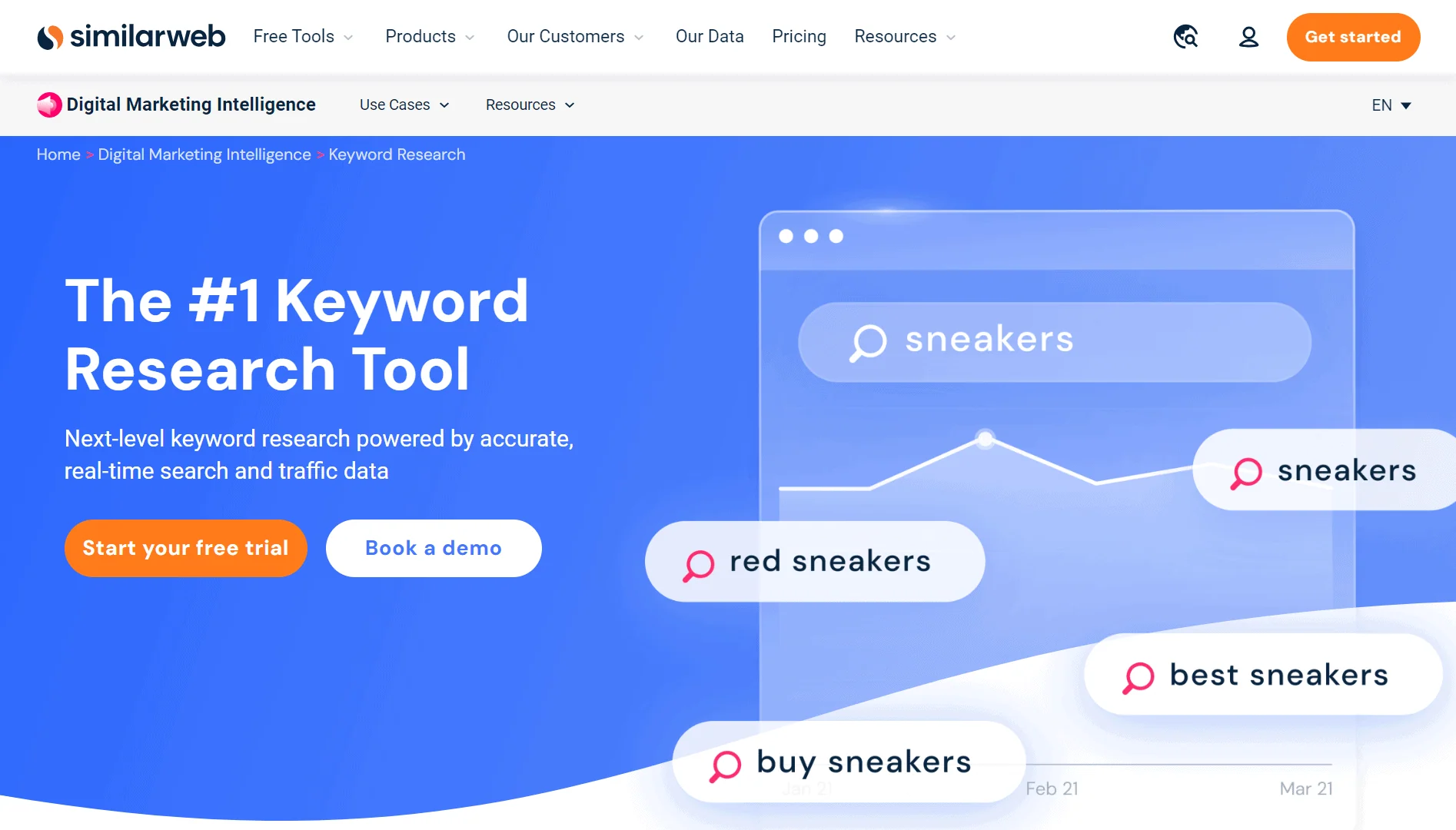
Similarweb is known as a competitive intelligence tool, providing insights into website traffic and marketing channels. As a keyword tool, its strength lies in competitor-based keyword research and broad analysis of trends, making it a complementary alternative to GKP.
Similarweb vs Google Keyword Planner: Key feature that makes Similarweb stand out:
- Industry trends and broad match: Similarweb has an industry analysis section where you can see trending searches in a category and the top sites gaining traffic for those searches. This macro-level view helps identify keyword opportunities based on market trends, going beyond GKP’s individual keyword metrics. It answers questions like “What topics in my niche are surging in search right now?”
G2 rating: 4.5/5 (976 ratings)
Pricing:
- 7-day free trial available.
- Paid subscription plans start from $125/month when billed annually.
11. Serpstat
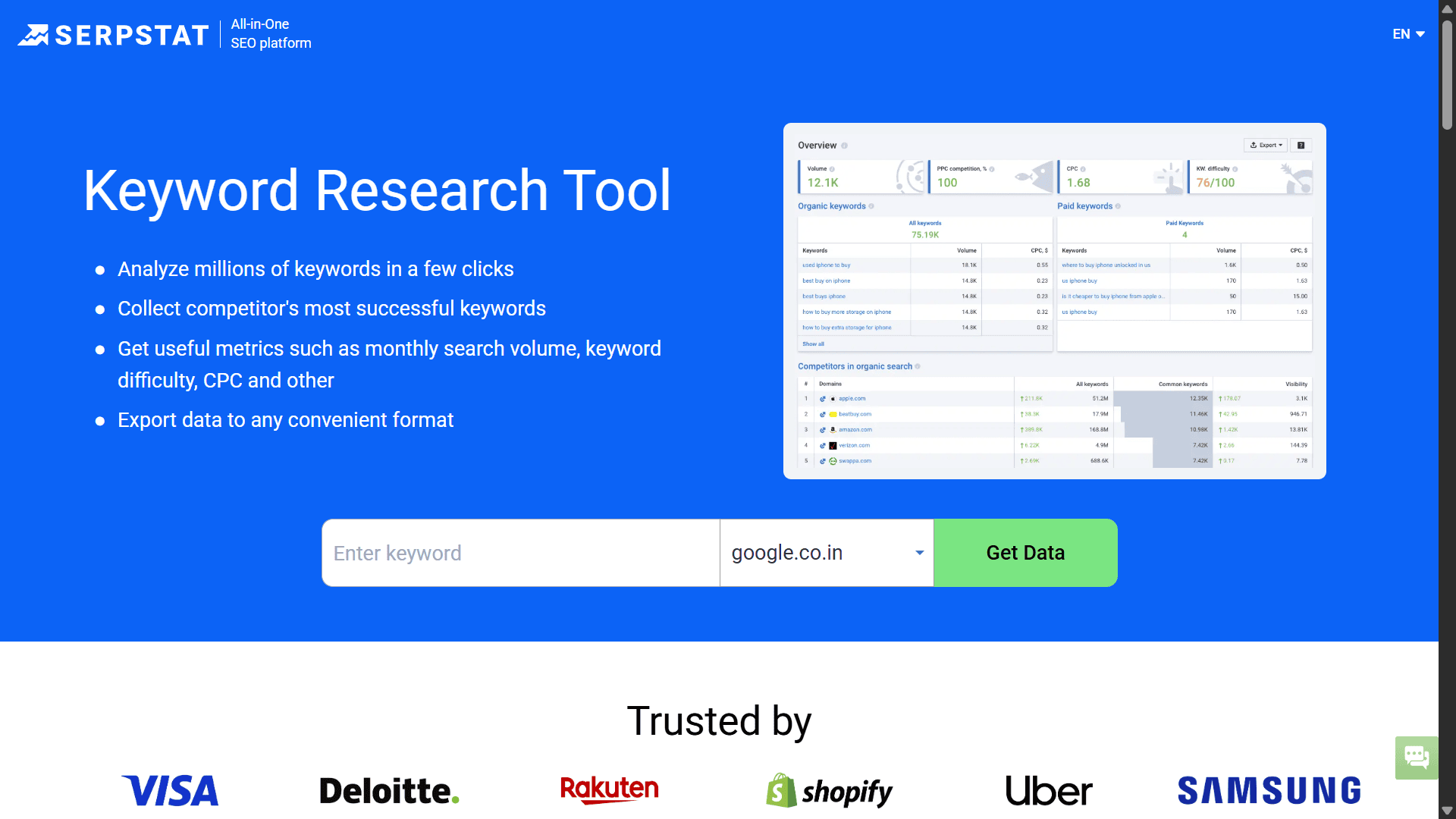
Serpstat is an all-in-one SEO tool that has grown globally, often praised as a cost-effective alternative to big players. Its keyword research tool is robust, offering a blend of search analytics and competitor analysis.
Serpstat vs Google Keyword Planner: Key feature that makes Serpstat stand out:
- Cluster research and missing keywords: Serpstat can identify “missing” keywords – terms your competitors rank for that you do not. This competitive gap analysis is something GKP doesn’t offer, and it’s incredibly useful for expanding your keyword list. Additionally, Serpstat’s new AI-powered clustering tool can automatically group a large keyword list into topic clusters, similar to SE Ranking’s feature.
G2 rating: 4.6/5 (462 ratings)
- 7-day free trial available.
- Paid subscription plans start from $50/month when billed annually.
12. Surfer
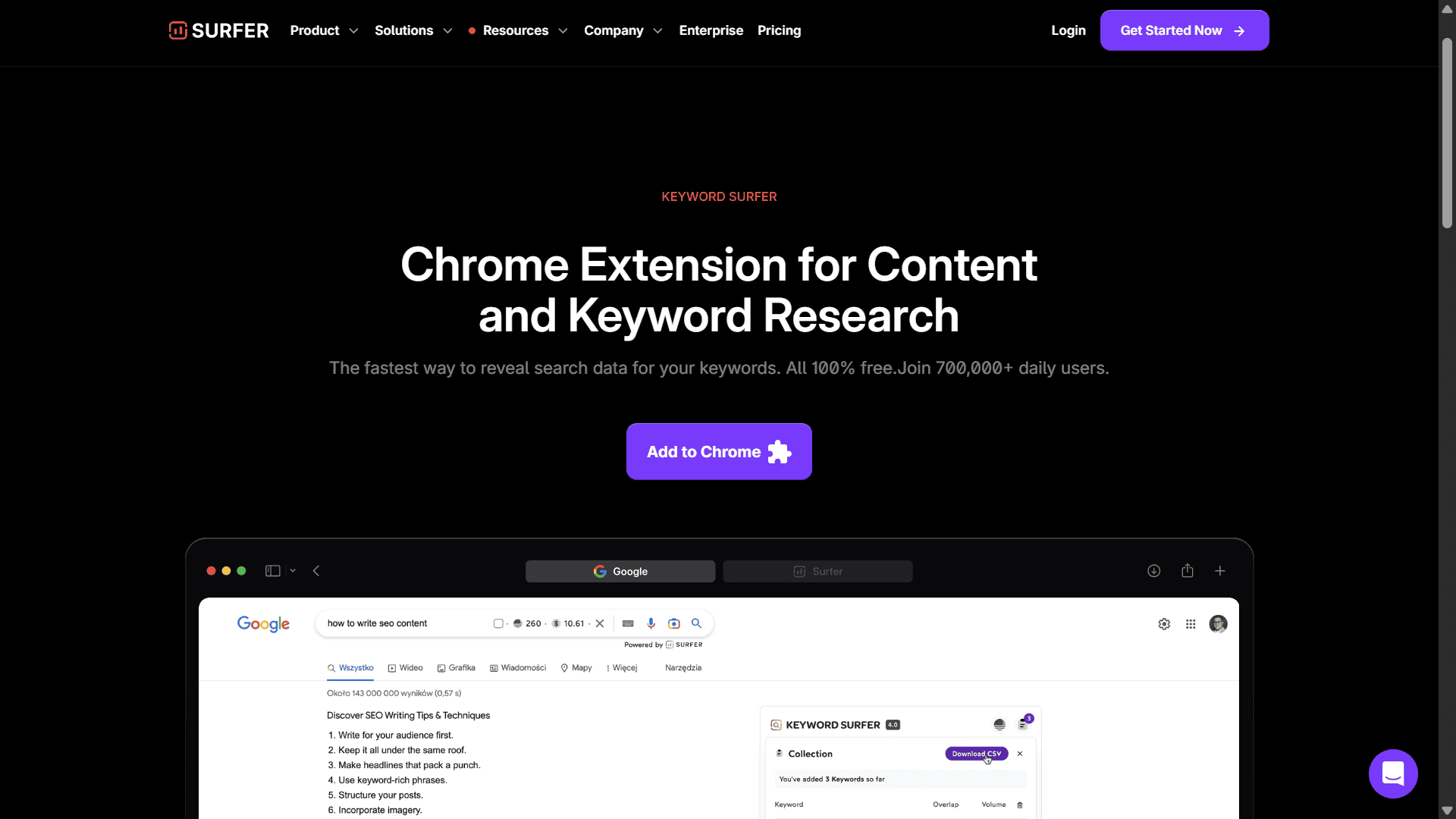
Surfer SEO, primarily known for content optimization, now offers robust keyword research tools. Its Content Planner identifies keyword clusters to build content hubs. The popular Chrome Extension delivers keyword ideas, search volume, and overlap scores directly in Google’s search results. This simplifies keyword research, allowing quick insights without switching tools.
Surfer vs Google Keyword Planner: Key feature that makes Surfer stand out:
- Topic clustering and content planning: Surfer’s Content Planner will take a broad topic and generate a cluster of subtopics/keywords you should cover to rank well in that niche. For example, inputting “digital marketing” might yield clusters like “digital marketing strategy,” “social media marketing tips,” etc., each with a set of relevant keywords. This goes far beyond GKP’s capabilities – it’s essentially automating the creation of a content roadmap based on keyword data and SERP analysis.
G2 rating: 4.8/5 (532 ratings)
- Paid subscription plans start from $79/month when billed annually.
13. Seobility
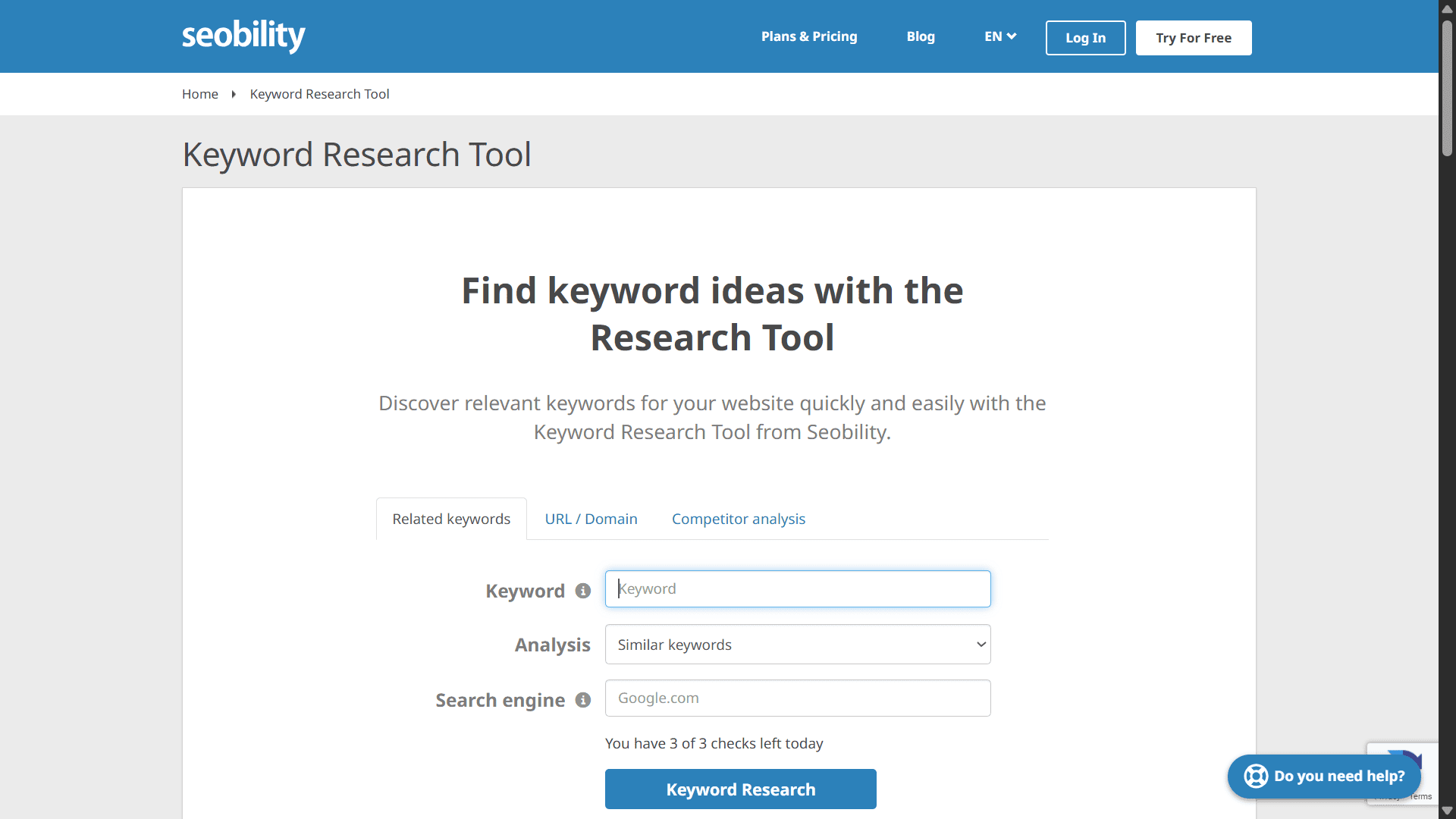
Seobility presents a robust suite for keyword research, ensuring businesses and SEO professionals get the most out of their content strategy and website optimization efforts.
Seobility vs Google Keyword Planner: Key feature that makes Seobility stand out:
- Advanced filtering options: Customize your keyword research using a myriad of filter options. Whether you’re after short-tail or long-tail keywords or you wish to include/exclude specific terms, Seobility helps you get the most refined results.
G2 rating: 4.6/5 (341 ratings)
- Freemium version is available.
- Paid subscription plans start from $50/month after a 14-day free trial.
14. SpyFu
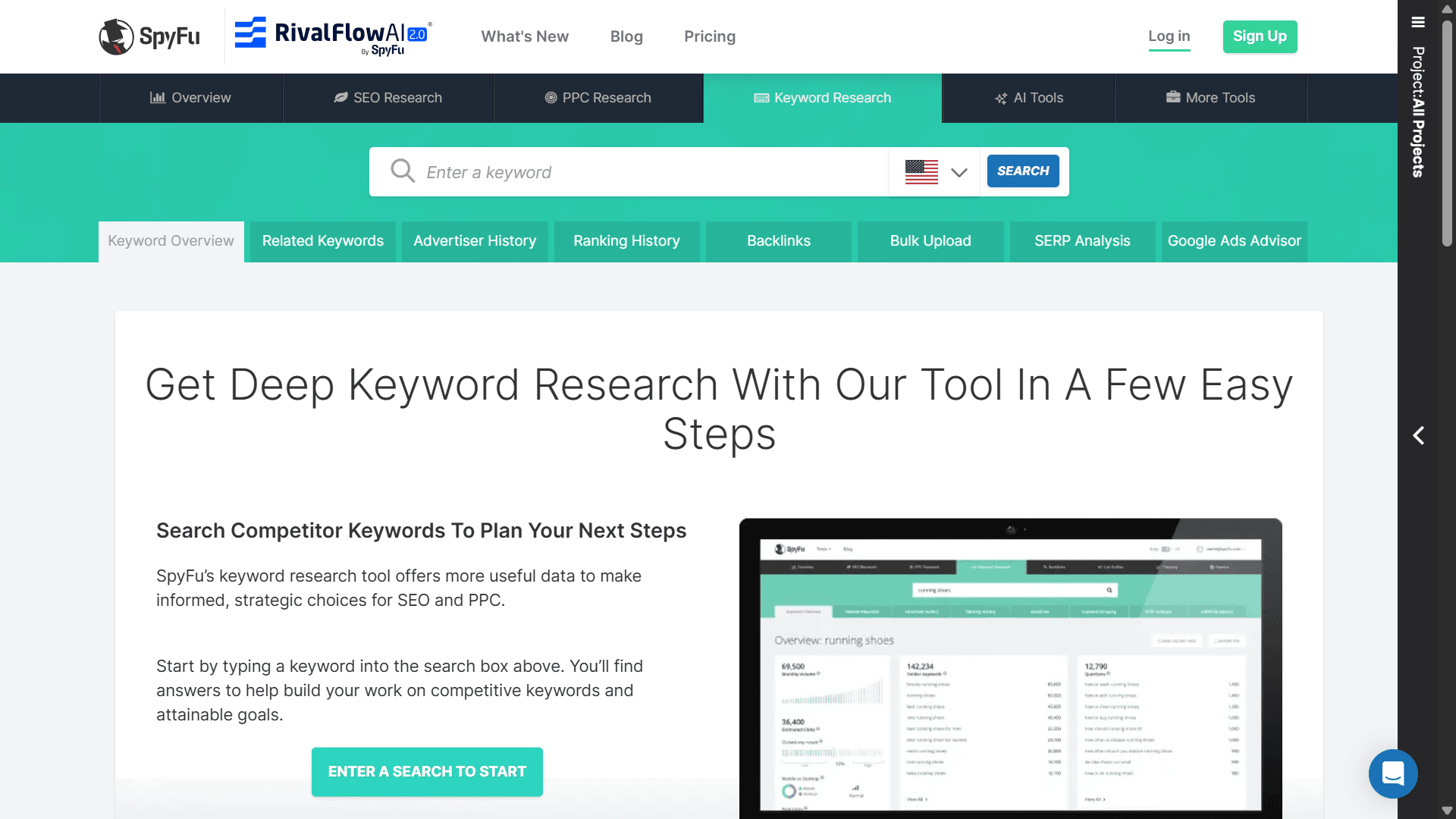
SpyFu is a popular SEO and PPC research tool known for its competitor-focused approach. As the name implies, it helps you “spy” on competitors – particularly useful in keyword research to uncover profitable terms your rivals target that you might have missed using GKP alone.
SpyFu vs Google Keyword Planner: Key feature that makes SpyFu stand out:
- Competitor keyword matrix: Enter a competitor’s domain in SpyFu, and you’ll see all the keywords they rank for organically, as well as the keywords they’re buying on Google Ads. This dual view (SEO & PPC) can reveal high-value keywords. GKP might show you keyword ideas if you input a site, but SpyFu goes deeper by also showing the ranking position and estimated traffic for each keyword.
G2 rating: 4.6/5 (512 ratings)
- Paid subscription plans start from $33/month when billed annually.
15. AnswerThePublic
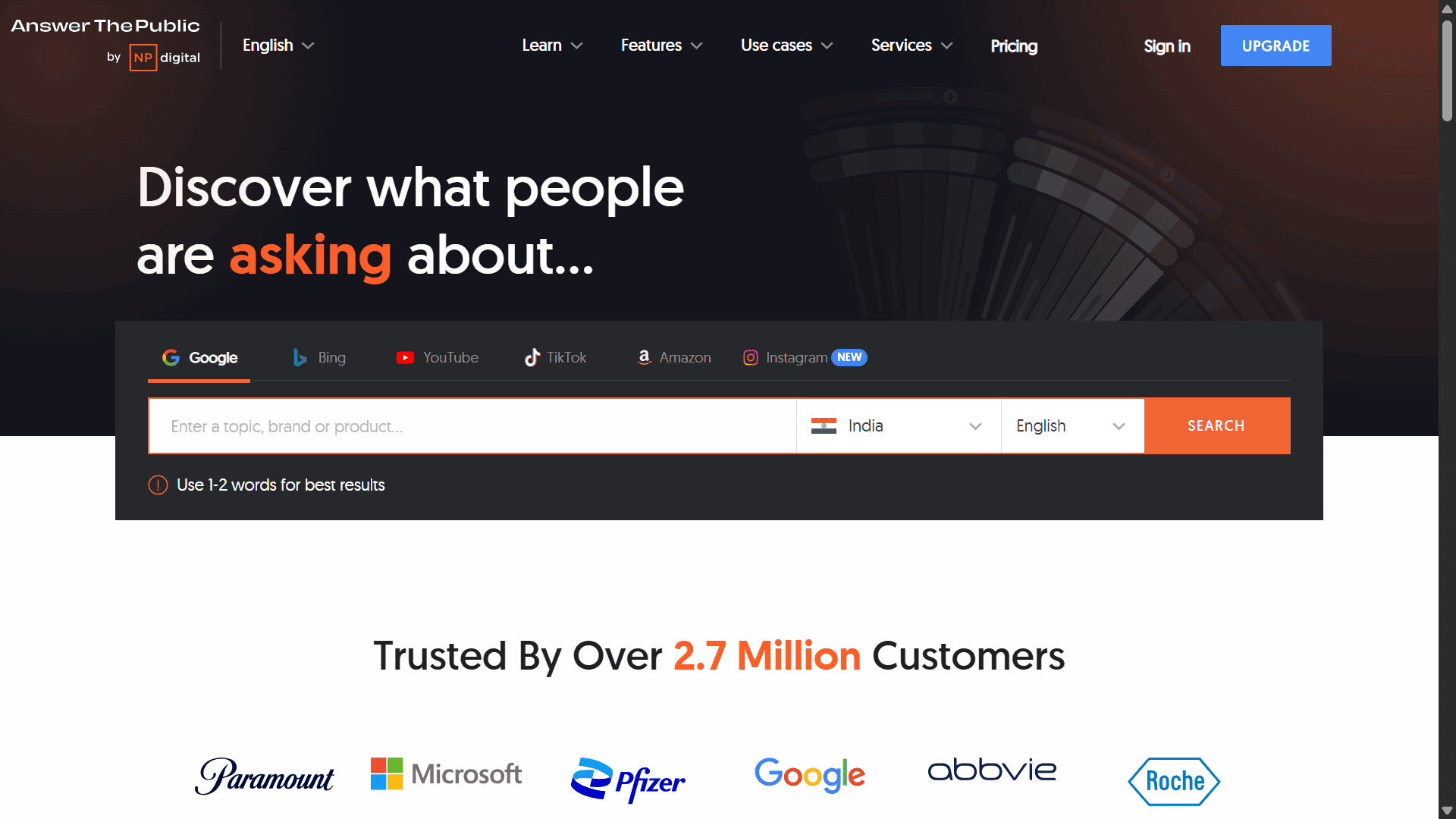
AnswerThePublic is a popular tool for content and SEO ideation, known for its visual “search cloud” of questions and phrases that start with words like “how,” “what,” “why,” etc. It taps into Google’s Autocomplete (and other suggest data) to present what real people are asking about a given topic. This makes it a superb complement to GKP – which gives you keywords, whereas AnswerThePublic gives you topics and questions. (Neil Patel’s company acquired AnswerThePublic in 2022, integrating it with Ubersuggest, but it remains available as a standalone tool.)
AnswerThePublic vs Google Keyword Planner: Key feature that makes AnswerThePublic stand out:
- Search intent questions: Where GKP might show “running shoes” and “best running shoes” as keyword ideas with volumes, AnswerThePublic will reveal the questions behind those queries – e.g., “what running shoes are best for flat feet?” or “how long do running shoes last?”. These granular long-tail queries often have lower volume, but extremely high intent and are perfect for targeting via blog posts or FAQ sections. GKP doesn’t explicitly list questions; ATP fills that gap with dozens of question-format keywords.
G2 rating: 4.5/5 (37 ratings)
- 7-day free trial plan is available.
- Monthly subscription plans start from $5/month.
- One-time purchase plans start from $50.
16. Soovle
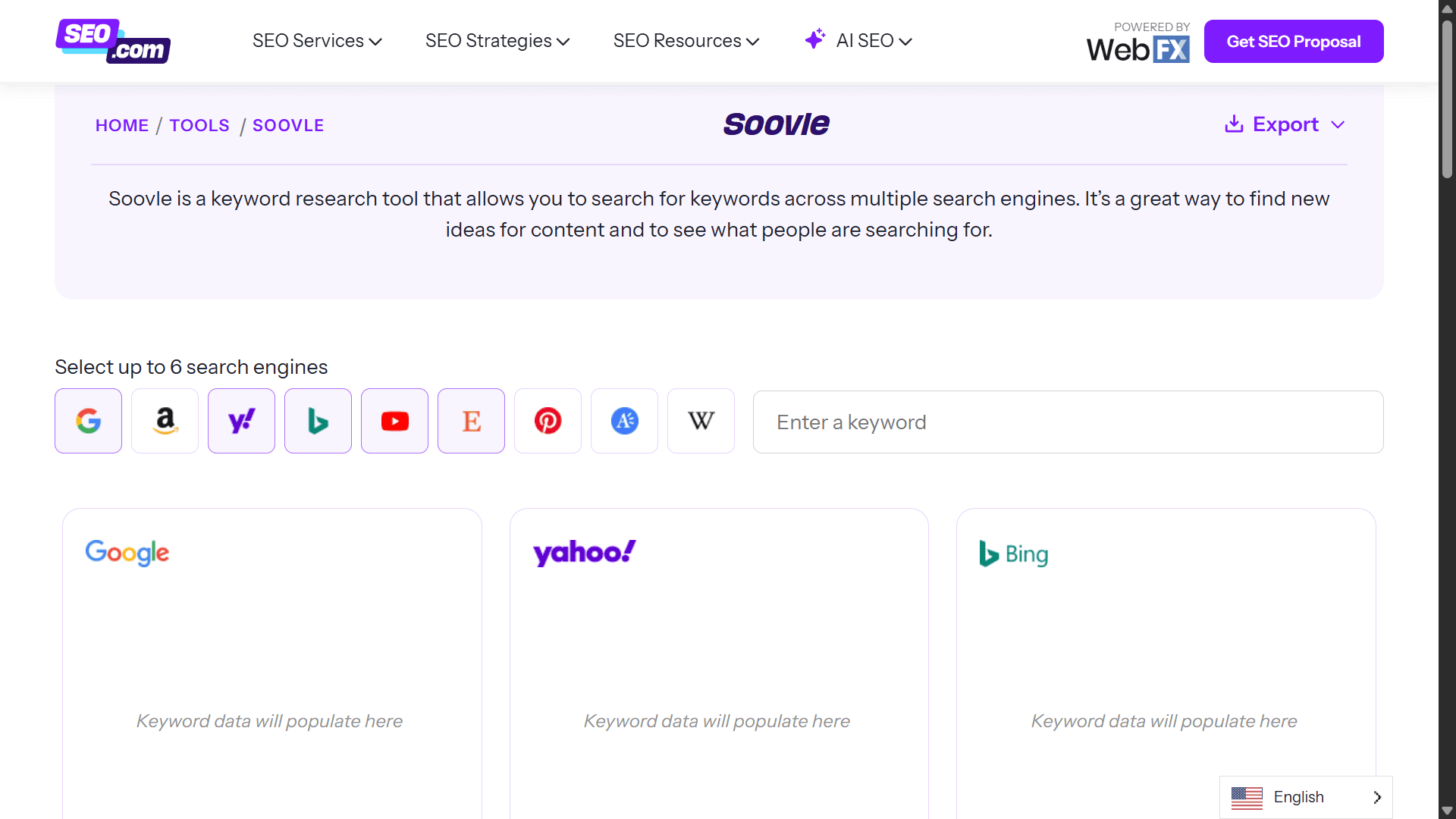
Soovle is a free aggregator tool that might look simplistic, but it’s very handy for brainstorming. It pulls autocomplete suggestions from multiple search engines and websites all at once – including Google, Bing, Yahoo, Wikipedia, Amazon, YouTube, and others. Think of it as a one-page glimpse into the minds of users across different platforms.
Soovle vs Google Keyword Planner: Key feature that makes Soovle stand out:
- Multi-source autocomplete suggestions: With Soovle, you enter a seed term and immediately see the top suggestions from each source. For example, type “digital marketing” and Soovle will show Google’s top completions (“digital marketing course”, “digital marketing jobs”, etc.), YouTube’s suggestions (maybe topics like “digital marketing tutorial”), Amazon’s suggestions (perhaps book-related, like “digital marketing for dummies”), and so on – all on one screen. GKP, in contrast, focuses on Google search volumes and won’t tell you what’s trending on YouTube or Amazon; Soovle gives a broader perspective. This can spark content ideas (maybe a YouTube video idea or an eBook topic) that pure Google-focused research might miss.
G2 rating: Listing not available
Pricing:
- Free to use
17. Google Trends
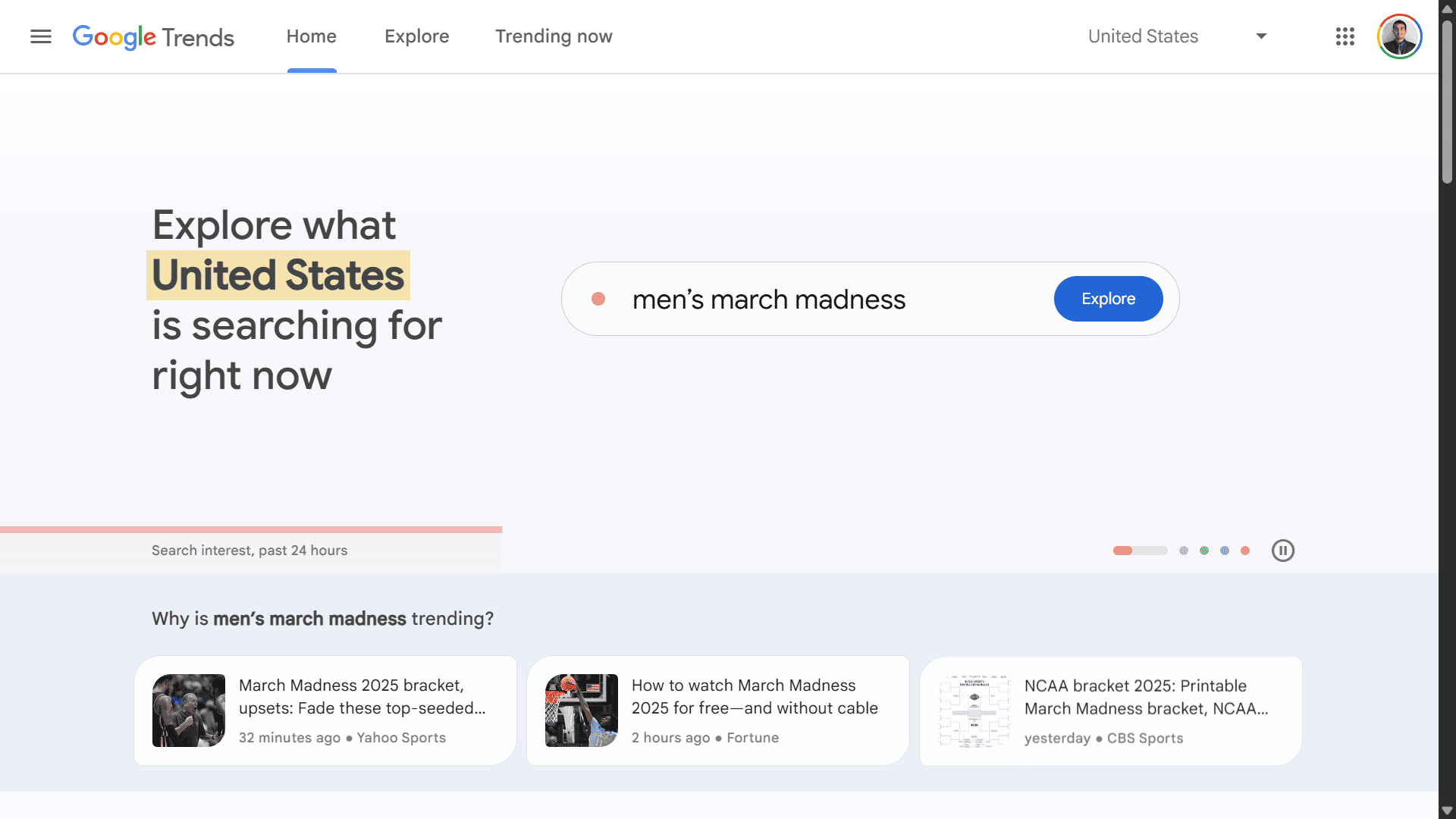
Google Trends is a public tool by Google that shows the relative interest over time for search terms. While not a direct keyword suggestion tool like GKP, it provides crucial context that GKP lacks – seasonality and trend direction. It’s an indispensable complement to keyword planning, ensuring you invest in keywords that are rising, not falling, in popularity.
Google Trends vs Google Keyword Planner: Key feature that makes Google Trends stand out:
- Interest over time: Google Trends plots a timeline (from 2004 to the present) of search interest for a query. For example, if you look up “cryptocurrency” on Trends, you might see its meteoric rise in recent years. GKP might tell you “cryptocurrency” has, say, 1 million monthly searches now, but Trends will show how it got there – was it 500k a year ago (doubling in interest) or has it plateaued? This helps you catch rising stars early or avoid fading topics. It’s especially useful for seasonal terms – e.g., knowing that “snowblower” spikes every December and is almost dead by July, which GKP’s 12-month average can’t fully illustrate.
G2 rating: 4.6/5 (231 ratings)
Pricing:
- Free to use
18. SurgeGraph
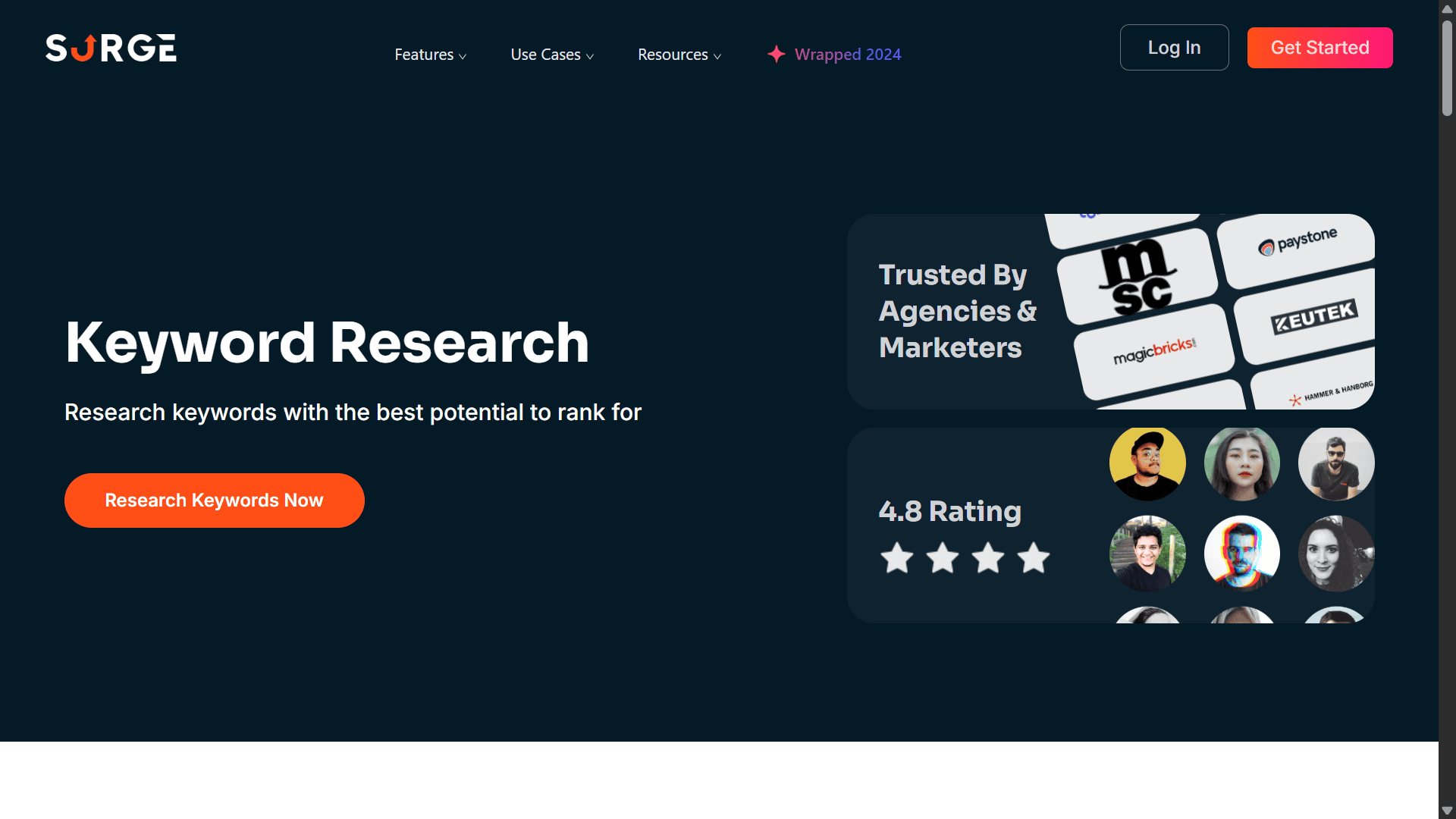
SurgeGraph, which started as LSI Graph, is a tool focused on semantic SEO and content-driven keyword research. It helps you find semantically related keywords (often called LSI keywords) and comprehensively build content that covers a topic. Lately, SurgeGraph has evolved to include an AI writing assistant (Vertex) for long-form content, but its keyword research roots remain strong.
SurgeGraph vs Google Keyword Planner: Key feature that makes SurgeGraph stand out:
- Semantic keyword suggestions: SurgeGraph provides contextually related keywords beyond basic variations. For example, searching “coffee” yields deeper topics like “fair trade certification” or “cold brew vs iced coffee,” enabling comprehensive coverage compared to Google Keyword Planner’s narrower suggestions.
G2 rating: 4.8/5 (29 ratings)
- Freemium version is available.
- Paid subscription plans start from $29.92/month when billed annually.
19. CanIRank
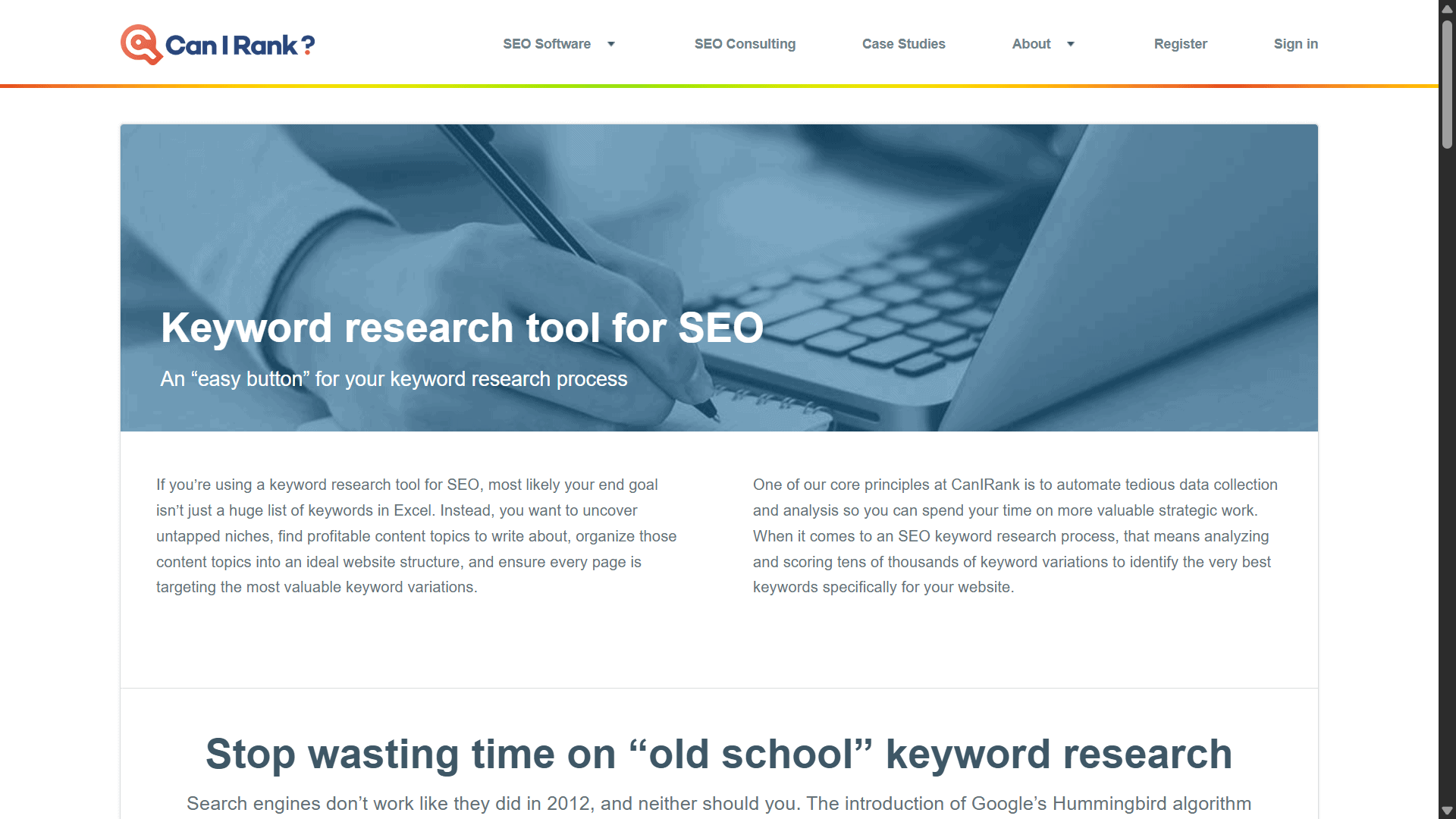
CanIRank is a unique tool that uses AI to analyze your website and provide actionable recommendations, including keyword opportunities. The name comes from its core question: “Can I rank for this keyword?” – something it attempts to answer with data-driven insights. Unlike Google Keyword Planner, which gives you raw data, CanIRank interprets data to give you a game plan.
CanIRank vs Google Keyword Planner: Key feature that makes CanIRank stand out:
- Personalized difficulty assessment: CanIRank analyzes your site’s content and backlinks against current top-ranking results to estimate your likelihood of ranking. For instance, for a keyword like “email marketing tips,” CanIRank may determine you have a 67% chance of ranking in the top 10. It also identifies specific areas (e.g., content or backlinks) holding you back. Unlike GKP, which leaves competitive analysis to you, CanIRank uses AI to automate this evaluation, saving you time and guiding you toward keywords aligned with your site’s authority.
G2 rating: 4.7/5 (11 ratings)
- Freemium version is available.
- Paid subscription plans start from $49/month.
20. Keyword Insights
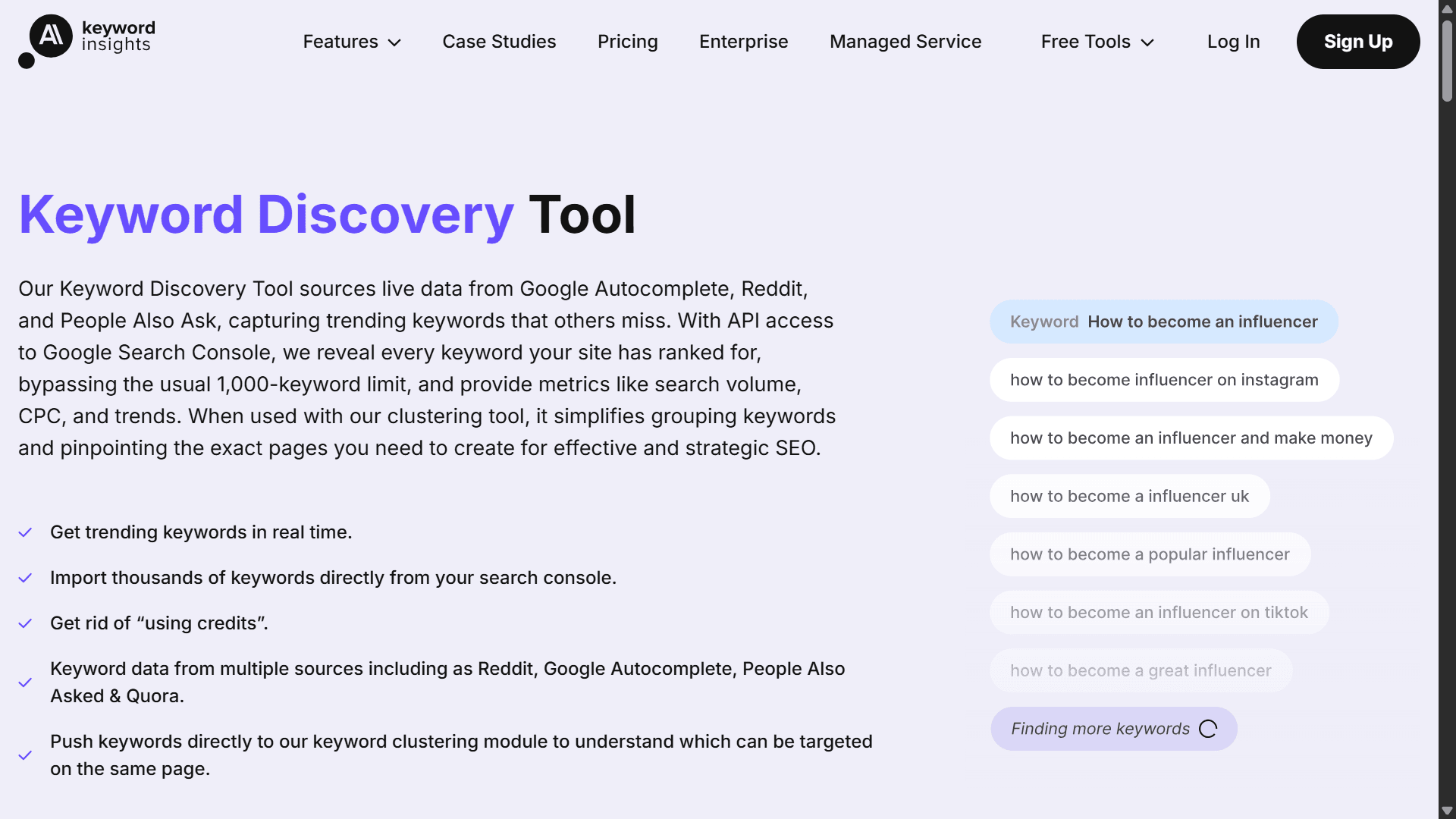
Keyword Insights is a relatively new tool (launched in the early 2020s) that has quickly gained traction for its AI-powered keyword clustering and intent analysis. It helps answer two critical questions after you get a big list from GKP or elsewhere: Which keywords should be grouped together and targeted by one page, and what is the search intent behind them? By addressing these, Keyword Insights has become a secret weapon for many SEOs working on large content projects or optimizing existing ones.
Keyword Insights vs Google Keyword Planner: Key feature that makes Keyword Insights stand out:
- Automated keyword clustering: Keyword Insights groups your keywords into content clusters by analyzing Google SERPs to identify which keywords rank together. For example, from 1,000 keywords, it might generate 20 clusters, each with a primary keyword and related variations. GKP doesn’t offer this, leaving you to identify keyword overlaps manually.
G2 rating: 4.9/5 (11 ratings)
- Freemium version with credit-based usage limits is available.
- Paid subscription plans start from $46/month when billed annually.
21. Keyword Revealer
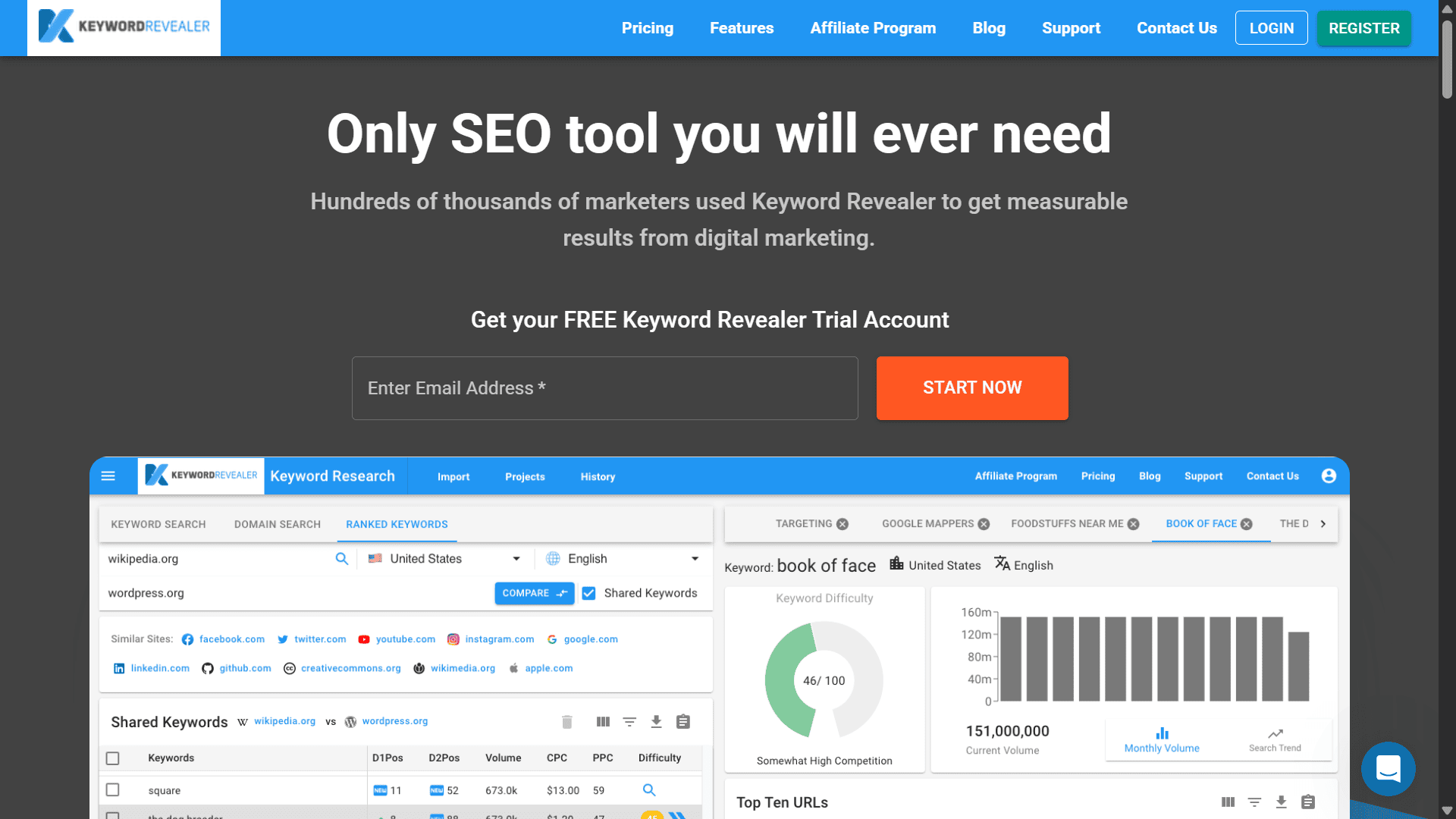
Keyword Revealer is a user-friendly keyword research tool that combines a lot of the favorite features from various tools into one interface. It’s known for its straightforward approach and is often recommended for beginners who need something more intuitive than GKP, or as a secondary tool to double-check data from Google Keyword Planner.
Keyword Revealer vs Google Keyword Planner: Key feature that makes Keyword Revealer stand out:
- SERP preview integration: For each keyword, Keyword Revealer lets you expand to see a preview of the current top 10 Google results, along with each site’s authority (via DA/PA or similar metrics) and the number of backlinks to that page. It’s a mini SEO audit for that keyword on one screen. You can quickly gauge why the difficulty score is what it is.
G2 rating: 4.3/5 (12 ratings)
Pricing:
- Freemium version is available.
- Paid subscription plans start from $12.5/month when billed annually.
22. Jaaxy
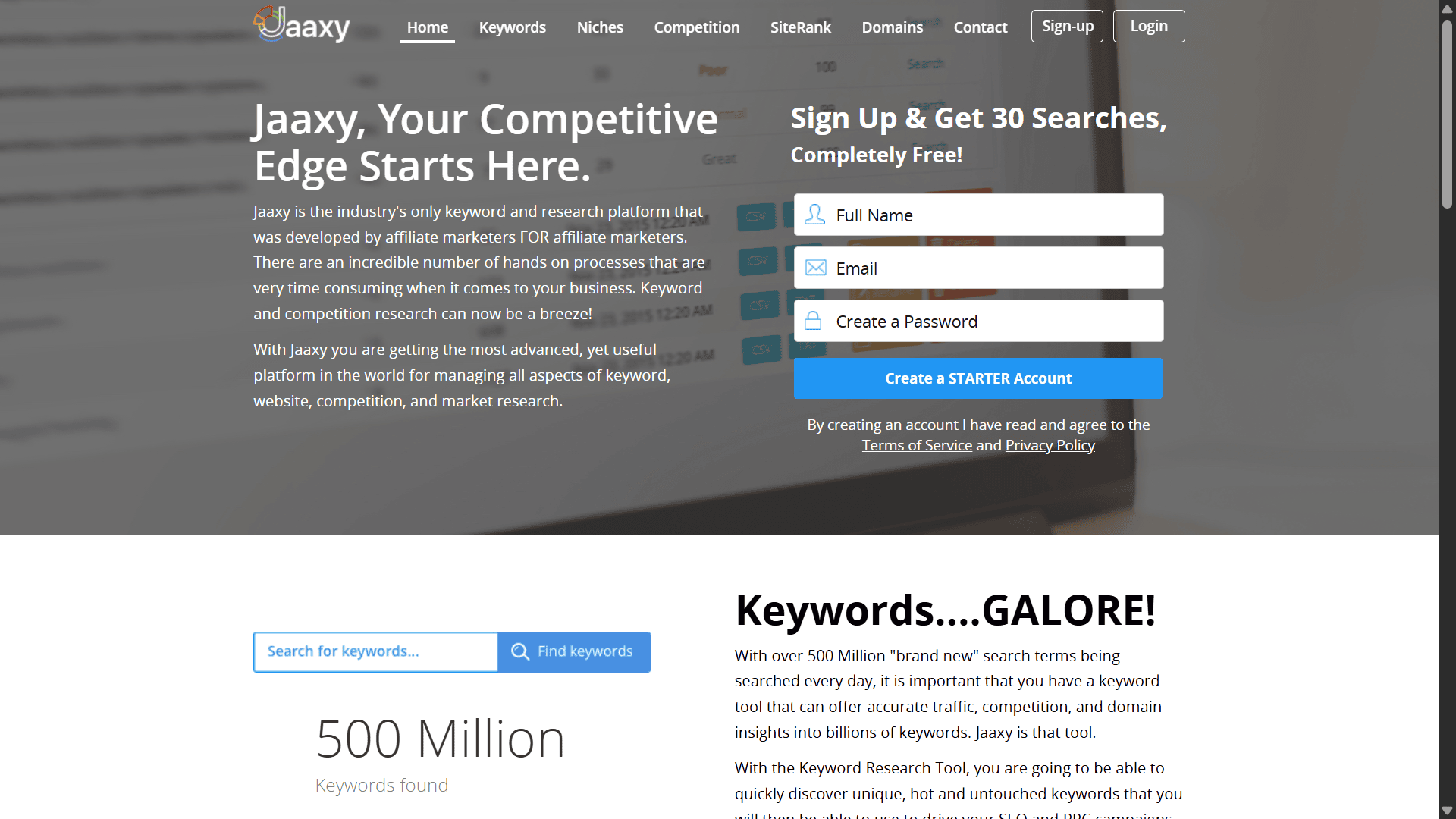
Jaaxy is a keyword research tool that gained popularity in the affiliate marketing community, particularly among users of Wealthy Affiliate. It emphasizes simplicity and is entirely cloud-based. Jaaxy provides keyword ideas, competition analysis, and some unique features tailored to content creators looking to rank in Google. It can be considered an alternative or complement to GKP when you want more insight into competition and some niche-specific metrics.
Jaaxy vs Google Keyword Planner: Key feature that makes Jaaxy stand out:
- QSR (Quoted Search Results): Jaaxy’s standout metric is QSR, which stands for the number of Google search results that contain the exact keyword phrase in quotes. This essentially tells you how many pages are directly targeting that exact term. For instance, a keyword might have 10,000 searches (per GKP) but a QSR of only 100 – indicating relatively few pages are optimized for that exact phrase. It’s a proxy for competition.
G2 rating: 4.2/5 (4 ratings)
- Free trial with limited searches is available.
- Paid subscription plans start from $49/month.
23. AlsoAsked
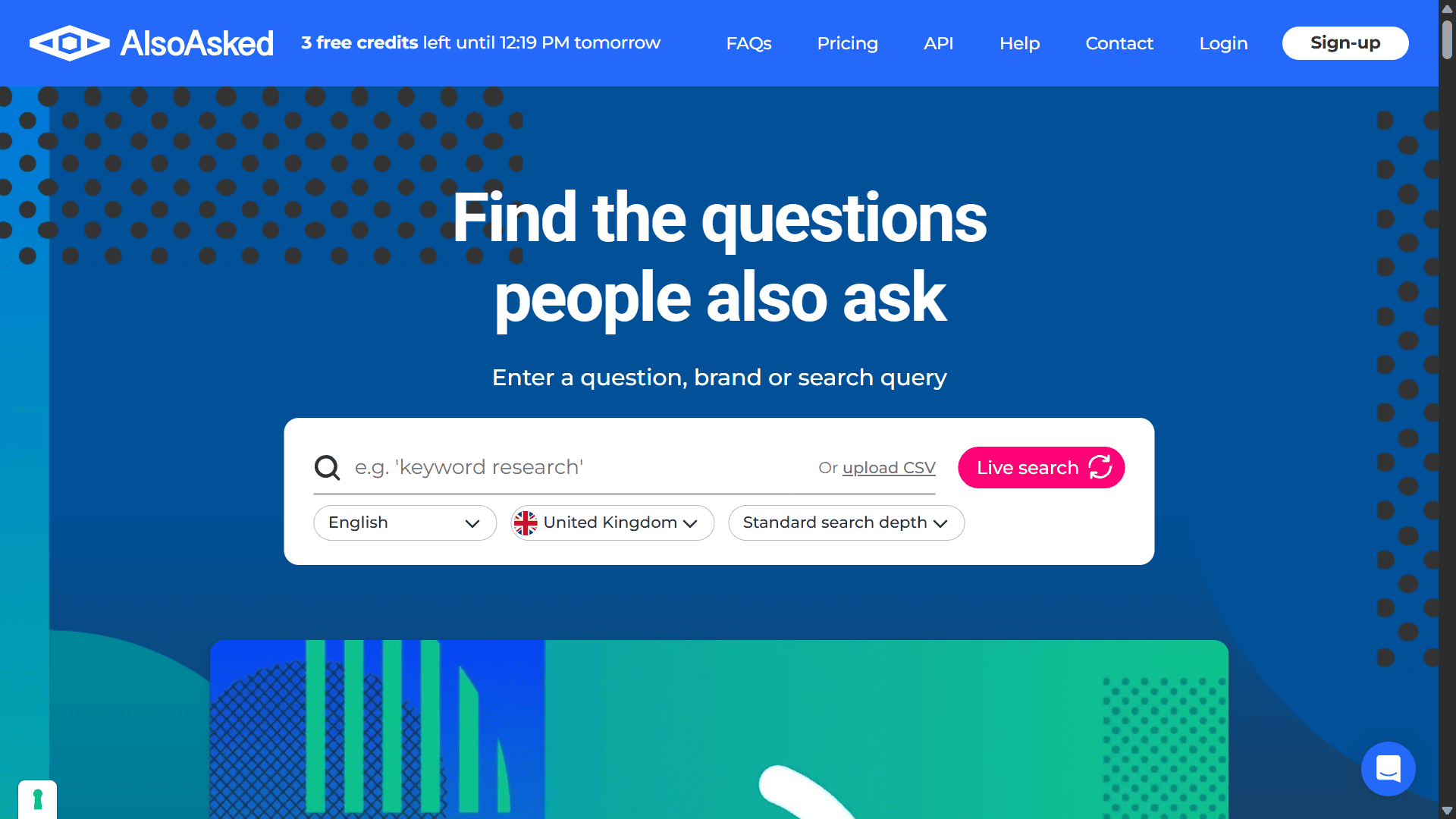
AlsoAsked is a tool dedicated to exploring the “People Also Ask” (PAA) questions on Google. Every time you search on Google, the PAA box shows related questions – AlsoAsked allows you to dig into that in a structured way. It visualizes how questions branch out from a root query. While AnswerThePublic (covered earlier) uses autocomplete, AlsoAsked specifically uses PAA data, which makes it very useful for understanding common user questions and subtopics.
AlsoAsked vs Google Keyword Planner: Key feature that makes AlsoAsked stand out:
- People Also Ask exploration: AlsoAsked generates content ideas by extracting and mapping questions from Google’s “People Also Ask” (PAA) boxes. Starting from your seed keyword (e.g., “SEO”), it identifies related user questions and expands iteratively into further related queries, visualizing them in a branching structure. This provides a clear map of user intent, guiding your content strategy from broad topics to specific sub-questions.
G2 rating: Listing not available
- Freemium version is available.
- Paid subscription plans start from $12/month when billed annually.
Rounding up: Time to upgrade from Google Keyword Planner
Our exploration led us through a meticulously curated list of 20+ Google Keyword Planner alternatives, each offering a distinct feature or advantage, from organic insights, vast databases, search intent breakdowns, and more. Armed with this newfound knowledge, the next step is clear.
If you’re serious about elevating your keyword research game, you must refresh your toolkit. And while many great options are available, why not start with a solution tailored specifically for SEO professionals and content marketers and suited for the AI era?
Twinword Ideas offers you the much-needed edge with features like user intent categorization, relevancy scores, and AI-powered automatic keyword grouping. It’s not just an alternative but an upgrade. Try Twinword Ideas for free today and supercharge your keyword research tech stack!
Check out other chapters in this series on keyword research:
Chapter 1: Overview Of Keyword Research
Chapter 2: What Is User Intent
Chapter 3: What Are Long-Tail Keywords
Chapter 4: What Is Keyword Difficulty
Chapter 5: Keyword Research Tools

